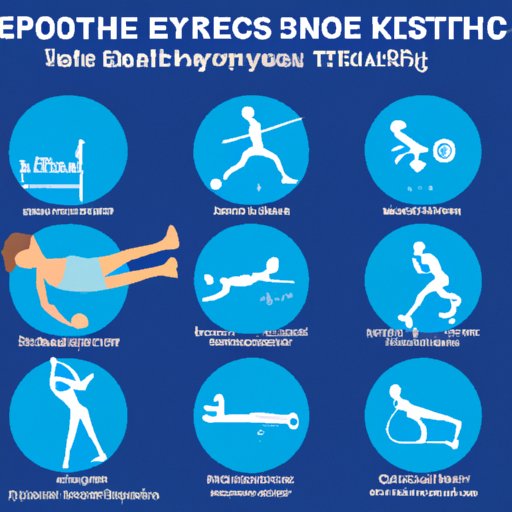
Introduction
Exercising is an essential part of a healthy lifestyle. However, deciding whether to exercise before bed or not becomes problematic. While some people believe that nighttime workouts can disrupt sleep, others swear by it as a natural sleep aid. This article aims to provide information about the benefits of exercising at night, debunking the myth of exercising before bed causing insomnia, the best exercises to do before sleeping, finding the optimal time to exercise, and bedtime stretches to do for a healthier body and mind.
The Benefits of Exercising at Night: How Working Out Before Bed Can Improve Your Sleep
Exercising at any time of the day improves overall physical and mental health. However, the time of day may impact the quality of sleep. Research suggests that exercising at night can lead to a better quality of sleep.
According to a study published in the journal Sleep Medicine, nighttime workouts resulted in an increase in slow-wave sleep, the deepest phase of sleep that promotes physical restoration and overall well-being. Additionally, scientists claim that working out before bed increases the production of melatonin, the hormone that regulates sleep cycles, resulting in faster sleep onset.
Exercise also releases endorphins, commonly known as the body’s natural pain relief system. Endorphins are a good way to relax and calm the mind, which may contribute to a restful sleep.
Breaking the Myth: Debunking the Idea That Exercising Before Bed Causes Insomnia
One of the most common myths about exercising before bed is that it causes insomnia. However, scientific evidence contradicts this popular belief.
According to research published in the Journal of Sleep Research, participants who exercised vigorously before bed slept as well as those who didn’t exercise at all. Moreover, people who performed light or moderate exercises at night had an improvement in sleep quality compared to those who did not exercise.
It is essential to note that everyone has a unique physiology and the effects of exercise may vary depending on each individual. It is best to listen to your body and adapt to a workout routine that suits your needs.
Nighttime Workouts: The Best Exercises to Do Before Sleeping for a Restful Night
When it comes to nighttime workouts, the best exercises to do before sleeping are low-intensity and calming activities. Yoga, Pilates, and stretching are excellent choices to improve flexibility and promote relaxation. Aerobic exercises, on the other hand, are not recommended before bed as they can stimulate the nervous system and interfere with sleep.
Yoga, in particular, has been proven to calm the mind, reduce stress, and promote a restful sleep. According to a study published in the Journal of Ayurveda and Integrative Medicine, regular yoga practice improved sleep quality and reduced the time it took to fall asleep.
Other recommended activities include walking, cycling, and swimming. These exercises do not exert too much pressure on the body and promote a calm and relaxed state of mind.
How Late is Too Late? Finding the Optimal Time to Exercise Before Bed
The ideal time to exercise before bed may differ from person to person. The individual’s circadian rhythm, sleep patterns, and lifestyle factors may affect the optimal time to work out.
However, a general rule of thumb is to finish exercising at least two hours before bedtime. This gives the body enough time to cool down and relax, preparing the body for optimal sleep.
For those who find it challenging to squeeze in a workout routine during the day, exercising at night may be the only solution. To find the optimal time to exercise, one should experiment with different times and listen to their body.
Some people may find that exercising before dinner works better for them, while others may enjoy working out after dinner. The key is to find a consistent routine that works for the individual.
Bedtime Stretches: Simple Moves to Do Before Sleeping for a Healthier Body and Mind
Bedtime stretches are an excellent way to release tension and prepare the body for a restful sleep. These simple moves can improve circulation, reduce muscle stiffness, and promote relaxation.
Some popular bedtime stretches include the seated forward bend, child’s pose, and the butterfly stretch. These stretches target the lower back, hips, and legs, promoting relaxation and ease of breathing.
It is essential to practice bedtime stretches correctly to avoid injuries and optimize their benefits. It is best to perform these stretches in a quiet and calm environment, preferably in a warm and comfortable space.
Conclusion
Exercising before bed has several benefits, including improved sleep quality, relaxation, and stress reduction. Contrary to popular belief, exercising before bed does not cause insomnia, as long as the routines are adapted to the individual’s needs.
The best exercises to do before sleeping are low-intensity and calming activities such as yoga, Pilates, and stretching. Finding the optimal time to exercise may require experimenting with different routines and listening to your body.
Finally, bedtime stretches are an excellent way to release tension and prepare the body for optimal sleep. Practicing these stretches correctly can promote a healthier body and mind.




